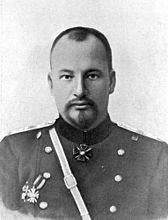Eugene Botkin facts for kids
Quick facts for kids
Eugene Botkin
|
|
|---|---|

Eugene Botkin
|
|
| Born |
Yevgeny Sergeyevich Botkin
27 March 1865 |
| Died | 17 July 1918 (aged 53) |
| Cause of death | Execution by firing squad |
| Occupation | Physician |
| Spouse(s) |
Olga Botkina
(div. 1910) |
| Children |
|
| Parent(s) |
|
| Relatives |
|
| Saint Eugene Botkin the Physician | |
|---|---|
| Righteous Passion-Bearer | |
| Venerated in | Russian Orthodox Church |
| Canonized | 2016 by the Russian Orthodox Church |
Yevgeny Sergeyevich Botkin (Russian: Евгений Сергеевич Боткин; born March 27, 1865 – died July 17, 1918), also known as Eugene Botkin, was a special doctor. He worked for the Russian royal family, Tsar Nicholas II and Tsarina Alexandra, starting in 1908.
Dr. Botkin often helped their son, Tsarevich Alexei Nikolaevich of Russia, who had haemophilia. This is a condition where blood does not clot properly. He was with the family during the Russian Revolution of 1917.
After the revolution, Dr. Botkin stayed with the Romanov family. He went with them when they were sent away to Tobolsk and Yekaterinburg in Siberia. Sadly, he was killed with the royal family on July 17, 1918.
Later, in 1981, the Russian Orthodox Church Outside of Russia recognized Dr. Botkin as a saint. He was called a New Martyr. In 2016, the Russian Orthodox Church also made him a saint. They called him Righteous Passion-Bearer Yevgeny the Physician.
Contents
Eugene Botkin's Early Life and Career
Eugene Botkin was born in Saint Petersburg, Russia. He was the fourth son of Sergey Botkin, who was also a famous doctor. His father worked for the previous Tsars, Alexander II and Alexander III.
Eugene's father helped create modern Russian medicine. He introduced new ideas like triage, which is how doctors decide who needs help first. Eugene learned a lot from his father.
Eugene studied medicine, just like his father. He went to the S. M. Kirov Military Medical Academy. He also studied in Germany. He worked as a doctor during the Russo-Japanese War. In 1907, he became the chief doctor at a hospital in St. Petersburg.
Eugene married Olga Vladimirovna Manuilova in 1891. They had four children: Dimitri, Yuri, Gleb, and Tatiana. Eugene spent a lot of time working for the royal family. This made his marriage difficult, and he and Olga later divorced.
His oldest son, Dimitri, died during the First World War. Eugene became more religious as he got older. His daughter Tatiana later wrote about his life.
His Time in Exile and Tragic Death
Dr. Botkin felt it was his duty to stay with the Romanov family. He believed he needed to care for them as their doctor and friend. He was also loyal to his country. Tsar Nicholas II considered Dr. Botkin a friend.
Dr. Botkin often spoke German with Tsarina Alexandra. He would help translate for her when she met with Russian officials. He was a trusted person for the royal family.
After Dr. Botkin and the family were killed, investigators found a letter he had started writing. This letter was stopped when Yakov Yurovsky came to his door. Yurovsky was in charge of the house where the family was held.
Yurovsky told everyone to get dressed and come downstairs. He said there was shooting outside and they needed to move to a safer place. But soon after, the entire family and their helpers, including Dr. Botkin, were killed.
Years later, in the 1990s, Dr. Botkin's remains were found. Doctors examined them and found bullet wounds on his legs, hips, back, and forehead.
Awards and Recognition
Dr. Botkin received several important awards during his life:
- Order of St. Vladimir, 3rd and 2nd classes
- Order of St. Anna, 2nd class
- Order of St. Stanislaus, 3rd class
- Order of St. Sava, 2nd class
- Bulgarian "For Citizenship Award"
After his death, he was recognized as a saint:
- 1981: Canonized by the Russian Church Outside of Russia as a New Martyr.
- 2016: Canonized by the Russian Orthodox Church as a passion bearer.
Eugene Botkin in Movies and Plays
Eugene Botkin has been shown in different types of media.
- He is a character in a play called Ekaterinburg by David Logan. This play is about the Romanovs' time in captivity.
- In the 1971 movie Nicholas and Alexandra, Dr. Botkin was played by Timothy West.
- He was also in the 1996 TV movie Rasputin: Dark Servant of Destiny. In this movie, David Warner played him.
See Also
 In Spanish: Eugene Botkin para niños
In Spanish: Eugene Botkin para niños
- Romanov sainthood
 | George Robert Carruthers |
 | Patricia Bath |
 | Jan Ernst Matzeliger |
 | Alexander Miles |

